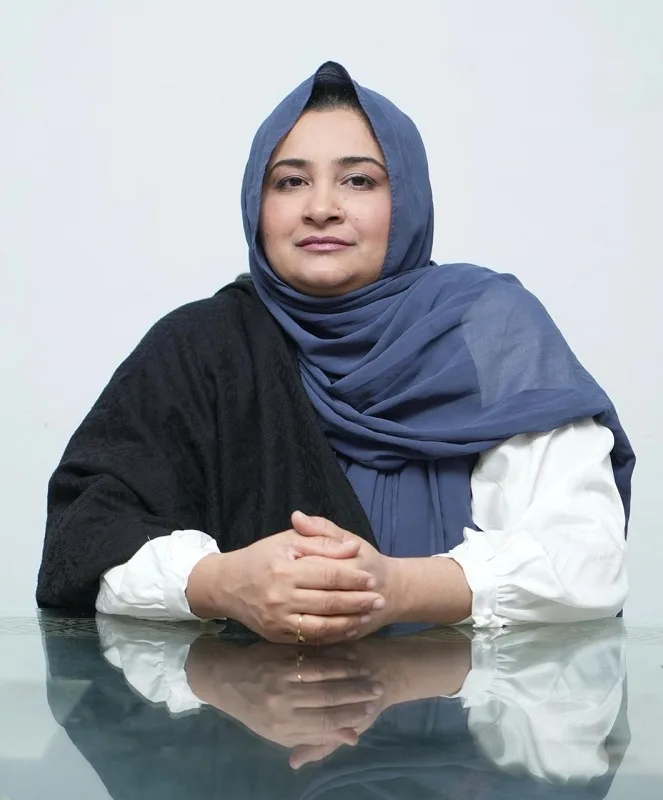Written by: Zehra Batool
Batool Fatima, running with the Grand Democratic Alliance (GDA) for PS-110 in Karachi, brings a new perspective to politics. A mother and housewife, she stepped into politics to address everyday challenges. Batool advocates women’s rights, improved transportation, a cleaner city, and transparent governance. As the only woman in a male-dominated field, she represents a fresh voice for change.

What inspired you to pursue a political role?
Batool Fatima: Every day, we face issues like the shortage of kitchen gas, frequent power outages, and inadequate water supply, prompting me and others to question the quality of life we experience. My decision to enter politics stems from a genuine desire for necessary change, not personal gain. Instead of quietly enduring these tribulations, I’ve chosen to voice concerns for my family, neighbors, and fellow citizens.
The perpetual dominance of a select few hereditary politicians, coupled with the intertwining of the corporate sector with politics, further complicates the challenges our nation faces. I’ve taken a stand because people seem to be taking from our nation without making real contributions. I’ve chosen to step out and address the perennial issues that continue to torment our country.
What motivated you to become the Grand Democratic Alliance (GDA) candidate for the upcoming elections?
BF: The GDA values inclusivity over hero worship. Its manifesto aligns with my vision. Led by Pir Sahib Pagara, the party strives to bridge urban-rural divides and promote inclusivity. Notably, Pir Sahib advocates equal opportunities, especially for women’s active participation and education, which strongly resonated with me.
Despite the Election Commission’s 5% women representation rule, the GDA allocated 17% of tickets to women, and I am one of them. As the sole female candidate in PS-110 among 44 contenders, my candidacy highlights the pressing need to empower women in politics, reflecting the GDA’s commitment to breaking gender barriers.
What strategies do you have in mind for empowering women in your constituency, both politically and socially, assuming you are elected?
BF: If elected, my plan involves partnering with various stakeholders, including activists and NGOs dedicated to women’s issues, to launch and execute projects aimed at boosting the political and social empowerment of women. The GDA will prioritize women’s education, ensuring access to quality learning opportunities and facilitating the establishment of businesses aligned with their skills. We’ll provide easy access to loans for financial independence and actively promote women’s inclusion across sectors to drive Pakistan’s economic progress. I strongly advocate for women’s active participation and plan to establish vocational centers, with a specific focus on the IT sector, enabling women to acquire valuable skills and contribute to the workforce, ultimately strengthening the economy.
How do you plan to navigate political polarization and collaborate with members of other parties to address common issues, contributing to the development of Karachi?
BF: In my view, politics is all about coming together through meaningful dialogue to find inclusive solutions. The issues faced by the city are bigger than any one person or political party. Despite differing visions and ideologies, a unified approach is integral to addressing the urgent matters of the city. We must understand that the development of Karachi is a shared responsibility that transcends individual perspectives or party affiliations.
Could you outline your vision for the city and discuss some of the strategic plans you have developed for its development?
BF: Certainly. Above everything else, I believe that an efficient transportation system is fundamental to economic prosperity. One essential initiative I am committed to is the revival of the circular railway, which was initiated in 1962 and ceased in 1999. This project has considerable potential to alleviate traffic congestion, minimize fuel consumption, and upgrade transportation amenities.
The Karachi Transport Corporation, once a crucial provider of efficient and affordable public transportation, has a substantial role in the city. Its restoration is imperative at present. The prevailing state of public transport, marked by privately operated buses and QingQi rickshaws, raises safety concerns. Our strategy incorporates a comprehensive approach to ensuring the safety of passengers and pedestrians alike.
Enhancing the city’s aesthetics and functionality is another priority. We plan to tackle the surge in street vendors and stalls. While acknowledging their economic importance, we put forth an innovative strategy that includes creating designated areas away from traffic for these businesses.
We also have an initiative aimed at environmental sustainability, with a dedicated focus on transforming Karachi into a greener, more eco-friendly city. Key initiatives include putting an end to illegal settlements, promoting afforestation projects, and designating green spaces to improve air quality.
Preserving our cultural heritage is also a pivotal aspect of our agenda. We aim to safeguard old buildings and promote the incorporation of emergency exits and parking spaces in new constructions. If granted the privilege of being elected, I will make these plans happen and make Karachi better for everyone.
What steps will you take to guarantee transparency in your work and demonstrate accountability to the constituents?
BF: We would ensure accountability by sharing quarterly reports on our progress and initiatives with the public that trusts us with their taxes and votes. Constituents can stay updated, report concerns, and give feedback through a dedicated app. This direct communication would help bridge the gap between us, the elected officials, and the community. Rest assured; our promises will be backed by tangible actions. We are not here to rule but to serve.
